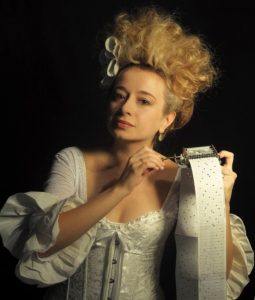Musical Genius All in the Family in Fair ‘The Other Mozart’
The evidence is sketchy, but it looks like two of the world’s greatest composers may have met in one of Vienna’s greatest artistic mind-melds. The year was 1787, and a star-struck Ludwig van Beethoven was quaking in his boots; his idol Johann Chrysostomus Wolfgang Amadeus Mozart had kindly requested an impromptu mini-concert, exchanging a lesson or two while politely ignoring his visitor’s sweat-soaked palms.
“Keep an eye on that one,” Mozart reportedly gushed of Beethoven, then only 17. “Someday, the world is going to beat a path to his door.”
Mozart, then 31, was already staking such a claim from his Salzburg roots, fueled by a prodigiousness that knew no words. Beethoven, of course, would go on to conquer the globe a hundred times over. But save the day’s circumstances, Mozart might have been singing the praises of someone whose otherworldly gifts rivaled his own — someone who lived under the same roof to boot.

Bad hair didn’t keep Nannerl Mozart (Sylvia Milo) from the music spotlight in her youth. COURTESY PHOTO
The script misses an important element of subtext, and the Balboa’s acoustics didn’t exactly help, at least not in a sparse environment like this. But Milo’s lithe, smart performance suggests that certain improvements would fuel a perfectly fine annual entry in a festival that finds itself expanding into opera, theater and pop.
Nannerl (given name Maria Anna, often rendered as Marianne) gives a loving account of her brother, who was five years younger — the “little shitter” was always crying in his infancy, she says, until music commanded his attention; the rest is history, as boy Wolfgang channeled the universe from the time his fingers could reach the harpsichord keys. Lore holds that Nan displayed equal genius, even receiving top billing in a brother-sister tour (Wolfie supposedly got his musical inspiration at age 3 as he watched dad Leopold teach Nan the harpsichord).
[Nannerl’s] death… marked an end to one of the world’s most disgraceful assaults on artistic expression…
Imagine, then, Nannerl’s crushing dismay in 1769 when Wolfgang and Leopold go on a European tour, leaving her to face a life of second-class citizenry despite her best efforts. Women were branded as addlebrained and psychologically inferior, so much so that they were effectively banned from playing the violin; they were to be kept barefoot and pregnant once of marriageable age, and court artisan positions for females were universally out of the question.
Real life says that Nannerl (the “-erl” suffix is a term of endearment in Austrian families) eventually married a judge and had three children, also helping raise the widowered magistrate’s five kids. She gave harpsichord lessons along the way, too — but her death in 1829 at age 78 marked an end to one of the world’s most disgraceful assaults on artistic expression and, by extension, to gender equality itself.
This script is largely taken from letters and other notations between the original family members — and its success lies in its loopy concessions to anecdote, the lifeblood of any story. The “little shitter,” it turns out, was also an inveterate playmate and confidant, once vowing to love big sis for “as long as we can fart.” “I’m writing to you with an erection on my head,” Nan groused to her brother following a routine bout with her bulky hairstyle.

Nannerl Mozart and brother Wolfgang belly up to the keyboard, doing what they do best.
Meanwhile, Milo’s portrayal can’t help evoke a couple questions stemming from Nannerl’s off-script biography. The noted and well-liked Martines was accepted to a prestigious music academy at the ripe old age of 29, her gender notwithstanding; couldn’t the ardent Nannerl at least have attempted to follow suit? And Nannerl fell in love with a private tutor only to accede to Leopold’s demand that she turn down the marriage proposal; mightn’t she have rebelled in her own behalf, as Wolfgang suggested? In other words, wouldn’t this script have benefited from material on Nannerl as her own worst enemy?
Furthermore: I’m not an audiologist, and I’ve consequently mentioned acoustical problems probably ten times in my more than 1,300 reviews. This is one of those occasions — without any buffers, the Balboa spreads sound in every direction but outward, inhibiting the upshot in Milo’s otherwise excellent inflections.
Theater critic John Simon once said that “There is something noble, indeed heroic, about the two-character play. It reduces human conflict to its barest, purest essence.” John’s point is well-taken, but shows like this go him one better. Maria Anna Mozart suffered terribly amid human conflict all by herself, thanks — and this Little Matchstick Factory entry, directed by Isaac Byrne, is a pointed indictment of the intimate history that fueled it.
Other Mainly Mozart events run through June 18. For more information, see mainlymozart.org or call 619-239-0100.

Martin Jones Westlin, principal at editorial consultancy Words Are Not Enough and La Jolla Village News editor emeritus, has been a theater critic and editor/writer for 25 of his 47 years…
More…


